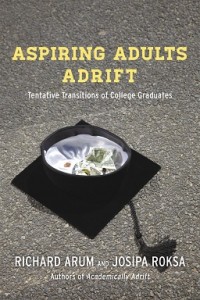Aspiring Adults Adrift
In 2011, Richard Arum and Josipa Roksa’s Academically Adrift inscribed itself in post-secondary education wonking with all the subtlety of a wax crayon; the book made a splash in major newspapers, on television, via Twitter, on the pages of popular magazines, and of course, inside policy debates. The authors’ argument—drawn from complex data analysis, personal surveys, and a widespread standardized testing of more than 2300 undergraduates from 24 institutions—was simple: 45 percent of these students demonstrated no significant improvement in a range of skills (critical thinking, complex reasoning, and writing) during their first two years of study. Were the undergraduates learning once they hit college? The book’s answer was, at best, a shaky “maybe.”
Now, the authors are back with a sequel of sorts: Aspiring Adults Adrift, which follows these students through the rest of their undergraduate careers and out into the world. The findings this time around? Recent graduates struggle to obtain decent jobs, develop stable romantic relationships, and assume civic and financial responsibilities. Their transitions, like their educational experiences, are mired in much deeper and more systemic obstacles than a simple “failure to launch.”
The book debuted last week with four-part coverage at Inside Higher Ed. Since then, pundits and reviewers have started to weigh in; below are just a few of their profiles and accounts, which for an interested audience, help to situate the book’s findings.
***
Vox asked, “Why hasn’t the class of 2009 grown up?“:
The people Arum and Roksa interviewed sounded like my high school and college classmates. A business major who partied his way to a 3.9 GPA, then ended up working a delivery job he found on Craigslist, sounded familiar; so did a public health major who was living at home two years after graduation, planning to go to nursing school. Everyone in the class of 2009 knows someone with a story like that.
These graduates flailed after college because they didn’t learn much while they were in it, the authors argue. About a third of students in their study made virtually no improvement on a test of critical thinking and reasoning over four years of college. Aspiring Adults Adrift argues that this hurt them in the job market. Students with higher critical thinking scores were less likely to be unemployed, less likely to end up in unskilled jobs, and less likely to lose their jobs once they had them.
. . . . . Roksa and Arum aren’t really arguing for a more academically rigorous college education. They did that in their last book. They’re fighting the broader idea of emerging adulthood—that the first half of your 20s is a time to prolong adolescence and delay adult responsibilities.
A Time piece chimed in:
Parents, colleges, and the students themselves share the blame for this “failure to launch,” Arum says, but, he adds, “We think it is very important not to disparage a generation. These students have been taught and internalized misconceptions about what it takes to be successful.”
Frank Bruni cited and interviewed the authors for his piece, “Demanding More from College,” in the New York Times:
Arum and Roksa, in “Aspiring Adults Adrift,” do take note of upsetting patterns outside the classroom and independent of career preparation; they cite survey data that showed that more than 30 percent of college graduates read online or print newspapers only “monthly or never” and nearly 40 percent discuss public affairs only “monthly or never.”
Arum said that that’s “a much greater challenge to our society” than college graduates’ problems in the labor market. “If college graduates are no longer reading the newspaper, keeping up with the news, talking about politics and public affairs — how do you have a democratic society moving forward?” he asked me.
And finally, Richard Arum explained the book’s findings in an online interview with the WSJ.
To read more about Aspiring Adults Adrift, click here.
